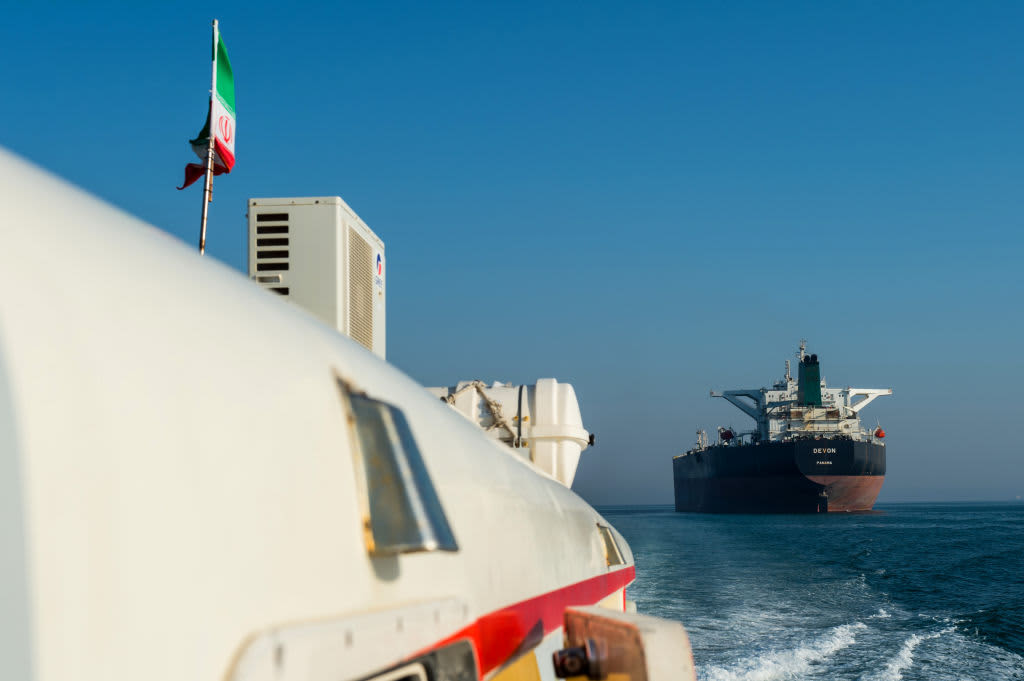
Oil prices would skyrocket if Iran moved to completely cut off the Strait of Hormuz, energy analysts told CNBC on Wednesday.
Elevated geopolitical tensions have sparked fears of a widening conflict in the Middle East, with energy market participants increasingly concerned that the fallout could soon disrupt regional crude supplies.
It has thrust the world's most important oil chokepoint back into the global spotlight.
Speaking to CNBC's "Capital Connection" on Wednesday, James Eginton, investment analyst at Tribeca Investment Partners, said a move by Iran to completely shut off crude supplies in the Strait of Hormuz would send oil prices "through the roof."
Situated between Iran and Oman, the Strait of Hormuz is a narrow but strategically important waterway that links crude producers in the Middle East with key markets across the world.
In 2018, daily oil flow in the channel — which is just 21 miles wide at its narrowest point — averaged at 21 million barrels per day. That's the equivalent of about 21% of global petroleum liquids consumption.
"If you block the Strait of Hormuz, you will send oil through $100," Eginton said.
"Over the next few days, if we start seeing the Iranians start trying to block the Strait of Hormuz then we should be set for much higher oil prices."
A support vessel maneuvers near the crude oil tanker 'Devon' as it sails through the Persian Gulf towards Kharq Island oil terminal to transport crude oil to export markets in Bandar Abbas, Iran, on Mar. 23, 2018.
Ali Mohammadi | Bloomberg | Getty Images
International benchmark Brent crude traded at $68.87 Wednesday morning, up almost 0.9%, having climbed to $71.75 earlier in the session — its highest level since September.
U.S. West Texas Intermediate (WTI) crude futures stood at $63.02, around 0.4% higher. WTI had jumped to a session high of $65.65 earlier in the trading day, before shedding most of its gains.
'No interest to anyone'
The latest uptick in oil prices followed confirmation from Pentagon officials that Iran launched more than a dozen ballistic missiles against multiple military bases housing U.S. troops in the early hours of Wednesday morning.
It was not immediately clear whether any U.S. service members had been hurt.
The missile strikes came just hours after the funeral of Qasem Soleimani on Tuesday. The slain Iranian military commander was killed by a U.S. drone at Baghdad International Airport late last week, ratcheting up already deteriorating tensions between Iran and the U.S.
The potential for a further escalation has prompted some to sound the alarm about the prospect of an unplanned oil supply shortage in the Middle East.
Francisco Blanch, head of commodities and derivatives research at Bank of America, has said he believes shutting off the Strait of Hormuz would most likely send crude futures toward triple digits.
In a research note published Tuesday, Blanch said that while the prospect of such a move remained unlikely, "given Iranian fears of a strong U.S. military response," it would cause a $20 to $40 jump in oil prices.
The Energy Information Administration (EIA) estimated that 76% of the crude oil and condensate that moved through the chokepoint went to Asian markets in 2018.
China, India, Japan, South Korea, and Singapore were thought to be the largest destinations for crude oil moving through the Strait of Hormuz to Asia over the same time period, accounting for 65% of all Hormuz crude oil and condensate flows.
For that reason, Samir Madani, co-founder of satellite tracking firm TankerTrackers.com, told CNBC's "Squawk Box Europe" earlier this week that disrupting shipping flows in the Strait would be "of no interest to anyone."
'A red line for Washington'
On Wednesday, the Wall Street Journal, citing sources, reported that Saudi Arabia's state tanker operator, Bahri, had suspended transits through the Strait of Hormuz.
British warships have also reportedly been stationed near the Gulf in order to support British-flagged oil tankers through the Strait of Hormuz if required.
"Though I feel it is unlikely, a significant disruption to oil supplies through the Strait of Hormuz could well usher in a new era of triple-digit oil prices," Stephen Brennock, oil analyst at PVM Oil Associates, told CNBC via email on Wednesday.
"It is also worth noting that any attempt by Iran to prevent vessels from passing through this chokepoint represents a red line for Washington."
"Such an event would therefore lead to an escalation in military conflict in the region. Needless to say, this risks causing supply disruptions elsewhere in the Middle East which, in turn, will give oil prices a further kick up the backside," Brennock said.
https://news.google.com/__i/rss/rd/articles/CBMibmh0dHBzOi8vd3d3LmNuYmMuY29tLzIwMjAvMDEvMDgvb2lsLXByaWNlcy10by1qdW1wLWFib3ZlLTEwMC1pZi1pcmFuLWJsb2Nrcy10aGUtc3RyYWl0LW9mLWhvcm11ei1hbmFseXN0cy5odG1s0gFyaHR0cHM6Ly93d3cuY25iYy5jb20vYW1wLzIwMjAvMDEvMDgvb2lsLXByaWNlcy10by1qdW1wLWFib3ZlLTEwMC1pZi1pcmFuLWJsb2Nrcy10aGUtc3RyYWl0LW9mLWhvcm11ei1hbmFseXN0cy5odG1s?oc=5
2020-01-08 12:16:00Z
52780545477811
Tidak ada komentar:
Posting Komentar